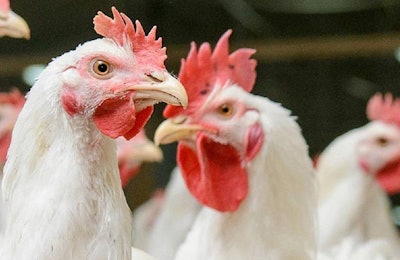
When consumers think that chickens are treated poorly, they think this has a direct impact on the safety and quality of the meat they buy, according to National Chicken Council (NCC) research. So, it is up to the poultry industry to present a more positive image to consumers and counter activists with the truth.
NCC research shared by Tom Super, senior vice president of communications, NCC, and Melissa Kinch, partner and associate director, Ketchum West, on July 11 at the Chicken Marketing Summit revealed several consumer misconceptions about chickens and the way they are raised. Of consumers surveyed:
- 78 percent believe most chickens are genetically modified to grow bigger/faster
- 77 percent believe there are added hormones/steroids present in most chickens
- 73 percent believe there are antibiotics present in most chicken meat
- 68 percent believe most chickens raised for meat are raised in cages
- 55 percent believe that the way most chickens are raised increases their risk of getting sick
- 44 percent believe a majority of raw chicken meat contains Salmonella
Where are consumers getting this inaccurate information? According to consumers surveyed by NCC:
- 68 percent say the media portrays the care of chickens negatively
- 62 percent say chicken labels/packages are misleading
Super and Kinch said this is exactly why the poultry industry needs to instill trust in consumers, by accepting consumers right to have questions and answer them with the level of detail consumers are looking for, as well as by inviting consumers to take a closer look at the industry.
“If we don’t open the doors ourselves and on our terms, activists will do it for us,” Super told the audience.

Tom Super, NCC, and Melissa Kinch, Ketchum West, discuss the poultry industry and consumer trust at the Chicken Marketing Summit on July 11. | Alyssa Conway
NCC's efforts to gain consumer trust
Super said the NCC is doing this by empathizing with consumers’ concerns to get the conversation started from a place of shared interest, using clear, educational language that tells a positive story and sets the record straight. Super and Kinch shared one tool NCC began in December 2015, ChickenCheck.In. NCC’s Chicken Check-In aims to answer consumer questions on topics that matter to them and clarify their misconceptions.
"It is really meant to be a vehicle for consumers or influencers who want to know more about how chickens are raised. It's meant to be black and white ... It's meant to be a pretty basic, 'here's what it looks like; let us answer your questions; you can make up your mind, consumers.' ... but in a way that is true, easy to access and answers questions," Kinch said describing the website.
The "A Day in the Life" video series is the most popular page on the ChickenCheck.In site, Super said. The videos, which follow a chick throughout its life, provide transparency to consumers by offering them a look into how broilers are raised.
The Chicken Marketing Summit, presented by the National Chicken Council and WATT Global Media, is being held July 10-12, 2016, at the Omni Hilton Head Oceanfront Resort in Hilton Head, South Carolina. The 2017 Chicken Marketing Summit will be hosted July 16-18, 2017, at the Historic Grove Park Inn in Asheville, North Carolina.















